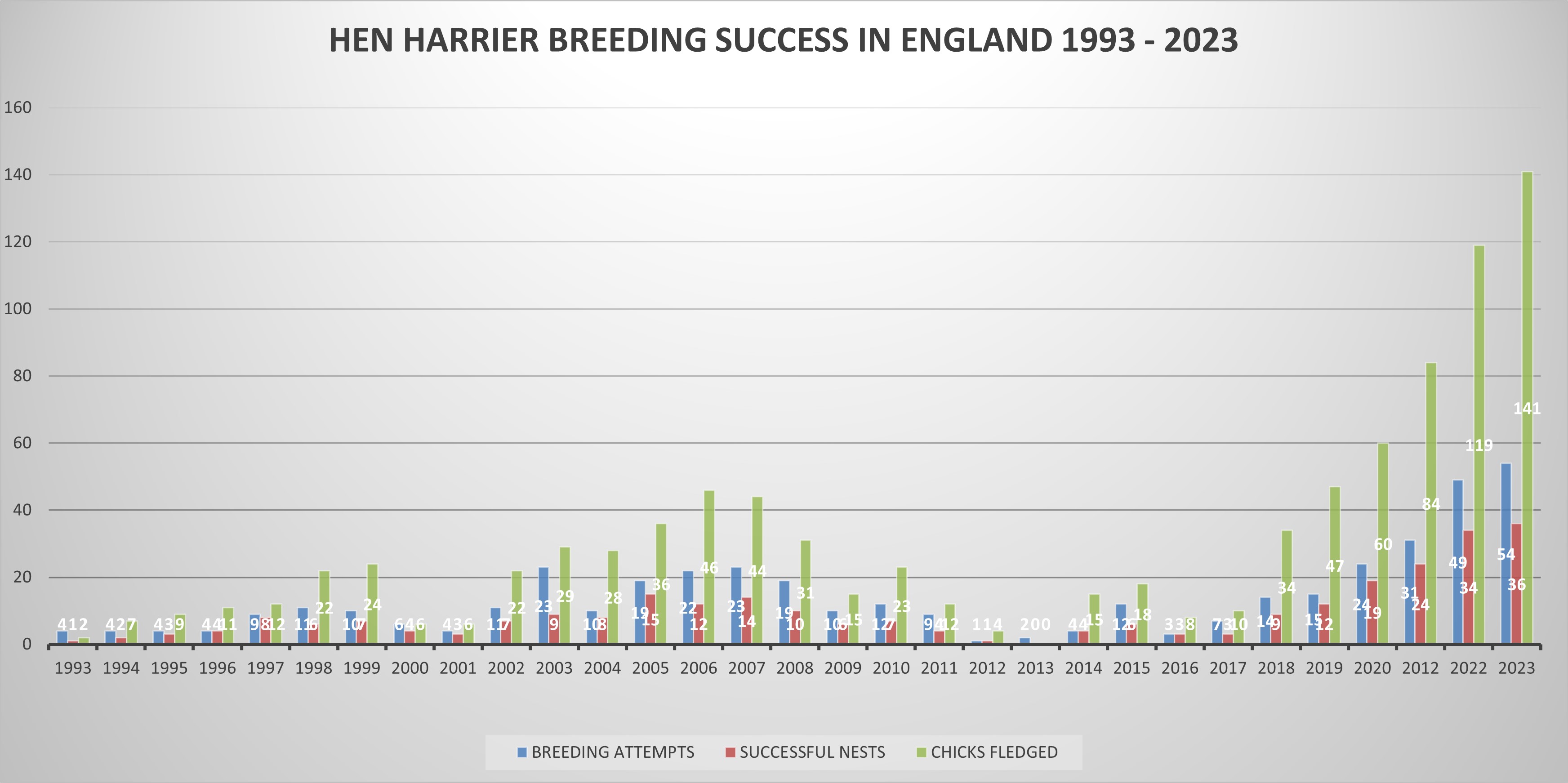Hen Harriers thrive - no thanks to the RSPB
This year has been the best for hen harrier breeding success in England since the 1960s, with 84...
about this blogRead moreThe hen harrier is one of our rarest birds of prey. Just 10 years ago, in 2013, no hen harriers nested in England, but there are now more nesting than at any point since they were lost as a breeding species around 200 years ago.
This year, Natural England has recorded a total of 54 nests, which is five higher than in 2022. Of these, 17 were in Northumberland, 15 in the Yorkshire Dales and Nidderdale, and 11 in each of the North Pennines and Forest of Bowland. 36 of those 54 nests were successful, compared with 34 last year, with a total of 141 chicks fledged. That figure is 22 higher than in 2022, and it has been suggested that this increase could be due to a higher number of small mammals this year, with adults finding it easier to supply their chicks with food.
A total of 485 hen harrier chicks have now fledged since Natural England issued its first licence for the Brood Management Trial in 2018, and this year's figure of 141 chicks is exceptional when compared with those during the previous 30 years. Our chart showing the number of hen harrier breeding attempts, successful nests, and chicks fledged in England between 1993 – 2023, says all that needs to be said about the success of the Brood Management Trial for hen harriers. Without the cooperation, dedication, and hard work of game keepers on grouse moors, this would not have been possible.

This year’s success has been welcomed by Natural England. Its Chair, Tony Juniper, announced that the continuing year on year increase in the number of hen harriers fledging from English nests was fantastic to see, and it showed how through partnership work it is possible to reverse Nature’s decline, even in the most challenging of circumstances. The encouraging numbers seen again this year were testament to the volunteers, landowners and partner organisations who have worked so hard to support and monitor these birds.
In contrast, the RSPB’s reaction to this year’s successful results was positively lacklustre, with a spokesman saying that: ‘The news that hen harriers have raised 141 chicks in England this year is encouraging’. But then the RSPB has had no part to play in this conservation success story, choosing instead to oppose the Brood Management Trial and southern re-introduction of hen harriers; two of the fundamental components of Defra's Hen Harrier Action Plan. Since the publication of the Plan in 2016, the RSPB has actively tried to prevent both the trial brood management of hen harriers from continuing, as well as the re-introduction of hen harriers to the south of England.
In 2019, the RSPB launched a Judicial Review into the brood management scheme, which was turned down by the High Court, all seven grounds for their application being dismissed by Mrs Justice Lang DBE. Although the RSPB appealed the High Court’s judgement over the lawfulness of brood management, this was dismissed by the Court of Appeal in November 2021, it being confirmed for a second time that the scheme was legal.
Correspondence obtained from Defra and Natural England under the Freedom of Information Act also showed that in 2019 the RSPB had been successful in preventing the southern re-introduction of hen harrier chicks from Spain. Although Natural England had the necessary infrastructure and personnel in place in Wiltshire to receive the chicks, and had allocated some £300,000 of public money on the project, no reintroduction of birds was possible due to the RSPB’s intervention.
Despite all the documentary evidence, the RSPB claimed at the time that: “The allegations that have been made that RSPB staff deliberately set out to influence the reintroduction of hen harriers to southern England are simply not true". One would not wish to sink to the RSPB’s depths and accuse them of lying, as they recently did with the Prime Minister, Michael Gove, and Therese Coffey in a most extraordinarily un-charitable political outburst, but one thing appears to be clear, and that is their lack of enthusiasm for the enormous improvements that are being made to the conservation status of our hen harriers.
![[Shooting]](https://www.countryside-alliance.org/hs-fs/hubfs/Imported_Blog_Media/Hen-Harrier-Female-Mar-30-2023-08-54-45-7040-PM.jpg?width=365&name=Hen-Harrier-Female-Mar-30-2023-08-54-45-7040-PM.jpg)
This year has been the best for hen harrier breeding success in England since the 1960s, with 84...
about this blogRead moreNatural England's recent announcement that 2019 has been a record-breaking year for hen harrier...
about this blogRead more![[Shooting]](https://www.countryside-alliance.org/hs-fs/hubfs/Imported_Blog_Media/hen-harrier-4-Mar-30-2023-08-34-55-9985-PM.jpg?width=365&name=hen-harrier-4-Mar-30-2023-08-34-55-9985-PM.jpg)
Natural England has recorded the best year for hen harrier breeding in England since its hen...
about this blogRead more